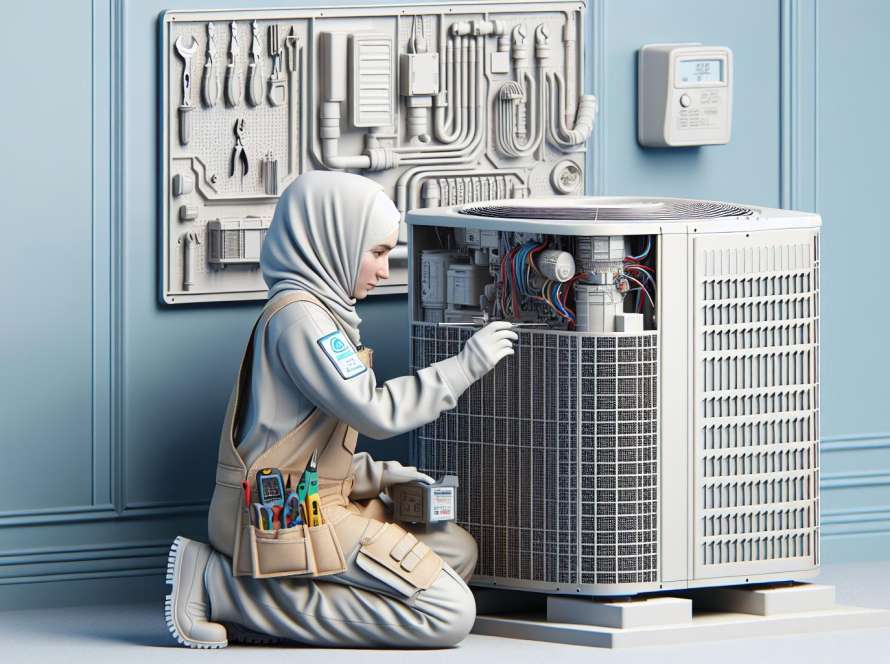So, we all know the struggle of dealing with AC issues, especially in the scorching Florida climate. The last thing we want is to be left sweating in the heat due to a malfunctioning air conditioner. That’s why it’s crucial to take proactive steps to prevent AC problems before they even arise. In this guide, we’ll share expert tips and tricks to help you keep your AC running smoothly all year round in Florida.
From high humidity levels to frequent thunderstorms, Florida’s climate can put a strain on your air conditioning system. But fear not, with the right maintenance and care, we can avoid costly repairs and ensure our AC unit stays in top-notch condition. Join us as we explore practical strategies to safeguard your AC against the challenges posed by the Florida weather. Let’s dive in and learn how to stay cool and comfortable without any AC hiccups.
Understanding the Impact of Florida Climate on Your AC
Living in Florida comes with its unique challenges when it comes to maintaining our AC units. The hot and humid climate, coupled with frequent thunderstorms, can take a toll on our cooling systems. Here’s how the Florida weather affects your AC:
- High Humidity: Florida’s humidity levels can cause our AC units to work harder to cool our homes, leading to increased wear and tear.
- Frequent Thunderstorms: Lightning and power surges during thunderstorms can damage the electrical components of our AC systems.
- Salt Air: For those living near the coast, salt air can corrode the metal parts of the AC unit, reducing its efficiency over time.
- Year-Round Usage: Due to the warm climate year-round, AC units in Florida are often running almost constantly, increasing the chances of breakdowns.
Tips for Maintaining Your AC in Florida
For Beginners: AC Maintenance Basics
- Changing Filters: Regularly replace or clean filters to ensure proper airflow and efficiency.
- Checking Thermostat Settings: Optimal thermostat settings can help save energy and prevent unnecessary strain on the AC unit.
For Intermediate Users: Enhancing AC Performance
- Routine Inspections: Schedule regular maintenance checks by a professional to catch issues early.
- Cleaning Coils: Keep the condenser and evaporator coils clean to maintain efficient cooling.
- Sealing Ducts: Ensure that ducts are properly sealed to prevent air leaks and improve cooling efficiency.
- Investing in Smart Thermostats: Upgrade to a smart thermostat for precise temperature control and energy savings.
In Florida’s climate, proactive maintenance is key to keeping our AC units running smoothly and avoiding costly repairs. By understanding how the weather impacts our cooling systems and following these tips, we can ensure comfortable indoor temperatures year-round.
Regular Maintenance Tips to Keep Your AC Running Smoothly

For Beginners: Mastering the Basics
- Change Air Filters Regularly: It’s vital for airflow and indoor air quality.
- Keep the Area Clean: Ensure no debris is blocking your AC unit.
- Check Thermostat Settings: Make sure they’re appropriate for the weather.
For Intermediate Users: Leveling Up Your Maintenance
- Inspect and Clean Coils: Dirty coils can strain your system.
- Seal Air Ducts: Prevents air leaks for better efficiency.
- Schedule Professional Inspections: Identify issues early and avoid costly repairs.
- Invest in a Smart Thermostat: Control your AC remotely for efficiency.
- Consider UV Light Installation: Helps control mold and bacteria growth.
- Opt for Routine Maintenance Contracts: Ensures regular upkeep by professionals.
| Key Fact | Data/Statistic |
|---|---|
| Regular AC maintenance can reduce energy consumption by up to 15%. |
Maintaining your AC system in Florida’s challenging climate is key to its longevity and efficiency. By following these regular maintenance tips tailored to your expertise level, you can ensure your AC runs smoothly and avoid unexpected breakdowns.
Importance of Proper Insulation in AC Efficiency
When it comes to ensuring optimal efficiency in your AC unit, proper insulation plays a crucial role. Let’s delve into how insulation can significantly impact the performance of your air conditioning system based on different user experience levels.
For Beginners: Understanding the Basics
- Insulation basics: Begin by learning about the importance of insulation in maintaining a consistent temperature indoors.
- Insulation materials: Familiarize yourself with common insulation materials like fiberglass, foam, and reflective insulation.
- Sealing gaps: Start by identifying and sealing gaps or leaks around doors, windows, and ductwork to prevent air leakage.
- Simple upgrades: Consider easy upgrades like adding weather stripping to doors and windows to improve insulation efficiency.
For Intermediate Users: Enhancing Your AC System
- Evaluate existing insulation: Check the current insulation levels in your home and consider adding more insulation where needed, especially in attics and crawl spaces.
- Invest in professional assessment: Hire a professional to assess your insulation needs and recommend upgrades for better energy efficiency.
- Upgrade insulation: Opt for high-quality insulation materials with higher R-values to enhance thermal resistance and reduce energy waste.
- Sealing ductwork: Inspect and seal any leaks in ductwork to ensure that cooled air reaches its destination efficiently.
- Consider spray foam insulation: Explore advanced options like spray foam insulation for superior air sealing and increased energy savings.
- Insulation for HVAC systems: Invest in insulating HVAC ductwork to minimize heat loss or gain between the unit and the vents.
- Whole-home insulation: Explore options for whole-home insulation solutions to create a more energy-efficient and comfortable living environment.
- Energy audits: Conduct regular energy audits to identify insulation deficiencies and make informed decisions for improvements.
By grasping the importance of proper insulation and implementing the recommended strategies based on your expertise level, you can enhance the efficiency of your AC system and create a more comfortable indoor environment in Florida’s challenging climate.
Dealing with High Humidity Levels: Strategies for Success
For Beginners: Understanding the Basics
- Humidity in Florida can make it feel hotter than it actually is.
- Use a dehumidifier to reduce moisture levels indoors.
- Ensure good ventilation by using exhaust fans or opening windows.
For Intermediate Users: Implementing Solutions
- Check and repair leaks in pipes and faucets that can contribute to humidity.
- Utilize air conditioning to help control indoor humidity levels.
- Consider installing a whole-house dehumidifier for more comprehensive humidity control.
- Explore smart thermostats that can adjust humidity levels automatically.
- Seal windows and doors to prevent outside humidity from seeping in.
- Invest in HVAC maintenance to ensure optimal performance for humidity control.
| Quick Facts |
|---|
| Florida’s average humidity level: 74% |
| Ideal indoor humidity: Below 60% |
| Impact of high humidity: Mold growth, worsened allergies |
We are here to help you tackle high humidity levels in Florida and optimize your indoor comfort.
Protecting Your AC During Thunderstorm Season

Thunderstorms are a common occurrence in Florida, and they can pose risks to your air conditioning system. Here are some tips to protect your AC unit during thunderstorm season:
For Beginners: Basic Precautions
- Turn off your AC during severe thunderstorms to prevent damage from power surges.
- Invest in a surge protector to safeguard your AC unit against electrical spikes.
- Clear debris around the outdoor unit to prevent clogs and damage from flying objects.
- Regularly inspect your AC system for any visible signs of damage after a storm.
For Intermediate Users: Enhanced Maintenance
- Consider installing a lightning rod to divert electrical currents away from your AC unit.
- Schedule regular inspections by a professional HVAC technician to ensure the system is in optimal condition.
- Protect your outdoor unit with a cover or awning to shield it from heavy rain and hail.
- Check your insurance policy to confirm coverage for AC damage caused by storms.
- Install a dedicated surge protector for your HVAC system to provide comprehensive defense against power surges.
- Invest in a whole-house generator to keep your AC running during power outages due to storms.
- Implement grounding systems for your AC unit to reduce the risk of lightning damage.
- Consider adding HVAC-specific insurance for additional protection against storm-related AC issues.
Remember, taking proactive steps to safeguard your air conditioning system during thunderstorm season can help prevent costly repair or replacement down the line. Stay prepared and protect your AC investment.
Conclusion
Ensuring proper humidity control and protecting your AC unit during thunderstorm season are crucial in Florida’s climate. By maintaining indoor humidity levels below 60% and implementing strategies like using dehumidifiers, sealing windows, and investing in HVAC maintenance, you can prevent issues like mold growth and allergies. When it comes to thunderstorms, taking precautions such as turning off the AC during severe weather, using surge protectors, and scheduling regular inspections can safeguard your unit. For advanced protection, consider installing lightning rods, covers, or awnings, and exploring insurance coverage options. By being proactive and following these tips, you can avoid costly repairs and keep your AC running smoothly in Florida’s challenging climate.

